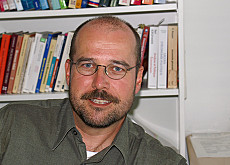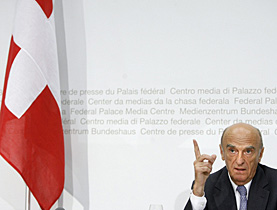Consensus politics should survive reform plans

The cabinet says it wants to push ahead with government reforms, which are aimed at strengthening the seven-member body.
The announcement comes amid a heated debate over whether President Hans-Rudolf Merz was right in acting alone last week by apologising to Libya for the 2008 arrest of Moammar Gaddafi’s son and daughter-in-law.
The justice ministry has been given until the spring of 2010 to come up with proposals. A few potential reforms were listed in a statement published on Thursday.
They include extending the one-year term of the president, which rotates among the cabinet ministers, and more closely linking the president’s office with that of the foreign ministry.
There was no mention in the statement of the impact recent crises may be having on the cabinet’s power-sharing arrangement.
Indeed, analysts and politicians from both the left and right believe the Libya affair and an assault on Swiss banking secrecy are no reason for sweeping reforms. They agree that cabinet ministers must show greater leadership within the existing structure, and do not see change as the answer.
“It would be too narrow to say the major problem is the system,” Georg Lutz, political scientist at Lausanne University told swissinfo.ch. “Things get messed up in every system.
” I would be very careful before proposing major reforms, not only because it’s unrealistic but also because it’s not so clear if it’s going to solve the problems.”
The problems include a government that has been criticised for failing to act quickly when industrial powers, led by Germany and the United States, took aim at banking secrecy in order to catch tax evaders. The troubles reached boiling point when Merz apologised to Libya without the backing of his cabinet colleagues.
Consensus
If anything, according to Luzi Stamm of the rightwing Swiss People’s Party, Merz’s decision to act alone indicates the strength of the current system of consensus, where the government must present a united front.
“If the president had had more possibilities – more decision-making power – it would have been even worse,” Stamm said. “The strength of the Swiss system is that it is not one individual who can bring the country into difficulties.”
Mario Fehr of the centre-left Social Democrats agrees: “He [Merz] acted on his own accord. You can’t be fully successful taking such an approach.”
While Stamm opposes any changes to a system he sees as “stable and balanced”, Fehr favours moderate reforms which would spread the cabinet’s heavy workload among nine instead of the current seven ministers, and/or by granting each minister a powerful deputy in the form of a state secretary.

More
Magic Formula
Bigger burden
The increasing responsibilities of each cabinet minister is one of the main reasons reforms are needed, the justice ministry said in its statement.
According to Thomas Fleiner, a constitutional law expert, changes will eventually be unavoidable for Switzerland to be more “flexible and adaptable to international developments”.
Fleiner told swissinfo.ch that the government’s inflexibility was shown up by Merz’s Libyan move, which was – under the current system – “constitutionally wrong”.
The legal expert said the president needed not only cabinet backing but support from parliament. And in this case, Fleiner added, approval from canton Geneva since Hannibal Gaddafi was arrested under Geneva’s jurisdiction.
“The real challenge for Switzerland is that it is very internationally involved. It is a small country with no real power, but still strongly involved with economic and other interests,” he said.
But Lutz, Stamm and Fehr say the power-sharing arrangement is not antiquated, with all three commending the government for the deal it negotiated with the US over access to the names of American residents holding accounts with bank UBS.
One voice
What is required, they agreed, is for the current ministers to show greater leadership and, in Fehr’s words, to “speak with one voice”.
If anything needs an overhaul, it is the cabinet’s communication policy, Lutz argued.
“It seems on delicate issues that no one takes responsibility as is the case in countries with prime ministers and presidents,” he explained. “There are arguments between ministries – who should be involved and at what stage and who should do what.
“On normal issues, that’s how the game is played here. But if it’s serious and involves foreign relations it can be very traumatic because people abroad assume statements issued by [Swiss] ministers are the statement of the government.”
Dale Bechtel, swissinfo.ch
The cabinet presently consists of four members of centre-right parties, two centre-left representatives and one from the leading rightwing party.
Members are elected for a four-year term, which ends in December 2011.
The party political make-up, known as the Magic Formula, remained unchanged for nearly 50 years until the rightwing Swiss People’s Party won a second seat at the expense of the centre-right Christian Democrats in 2003.
Parliament’s refusal to confirm controversial Justice Minister Christoph Blocher in 2007 led to the emergence of the small, more moderate Conservative Democratic Party, which is also represented in the cabinet.
The Swiss cabinet has come under the spotlight as a result of two burning issues: the fallout of President Hans-Rudolf Merz’s talks to end a standoff with Libya and a tax dispute with the US over the UBS bank.
Merz signed a pact between Libya and Switzerland on August 20 to “normalise” relations – strained since the arrest of Moammar Gaddafi’s son last July. He also expressed his apologies for the “unjust arrest of Libyan diplomats by Geneva police”.
His actions prompted an outcry and sparked concerns about violations of national law and rules governing the collective decision-making process of the government.
Concern has also been expressed that an independent arbitration panel will investigate the incident. Some critics say this undermines Swiss law and its federalist system.
The government also had to intervene to resolve a probe into alleged tax evasion by wealthy US customers of Swiss bank UBS. A deal was struck between the US and Switzerland to hand over the details of 4,450 American accounts.
The accord is expected to ease tensions in relations between Washington and Switzerland over possible violations of the country’s banking secrecy laws and prevent a clash of Swiss and US jurisdictions.
However the centre-left Social Democratic Party have asked who will foot the bill for the intensive manpower required to keep UBS out of court.

In compliance with the JTI standards
More: SWI swissinfo.ch certified by the Journalism Trust Initiative













You can find an overview of ongoing debates with our journalists here . Please join us!
If you want to start a conversation about a topic raised in this article or want to report factual errors, email us at english@swissinfo.ch.